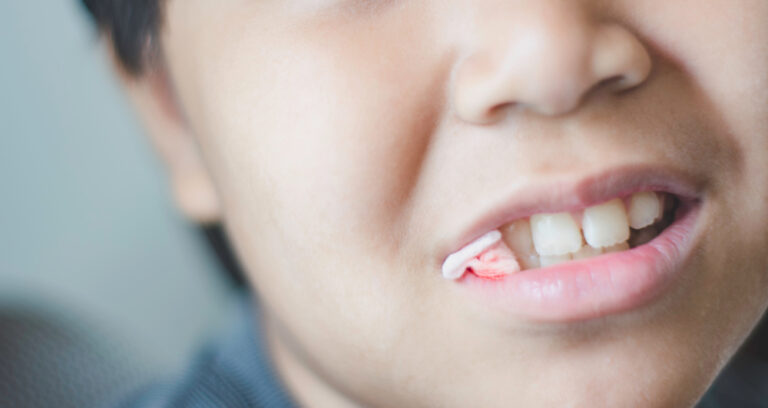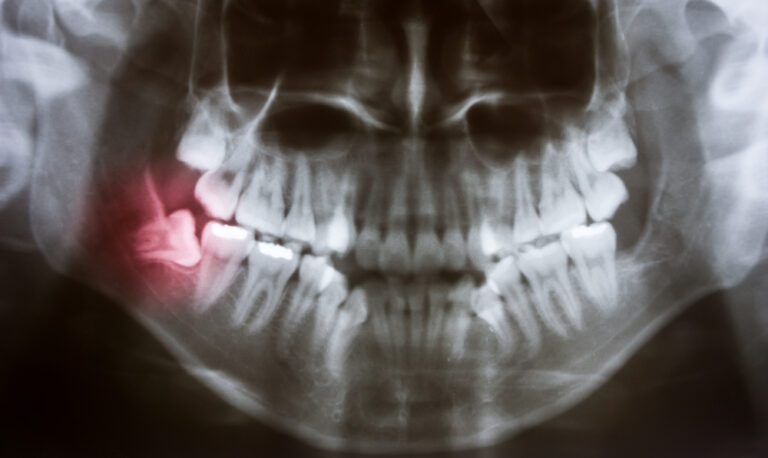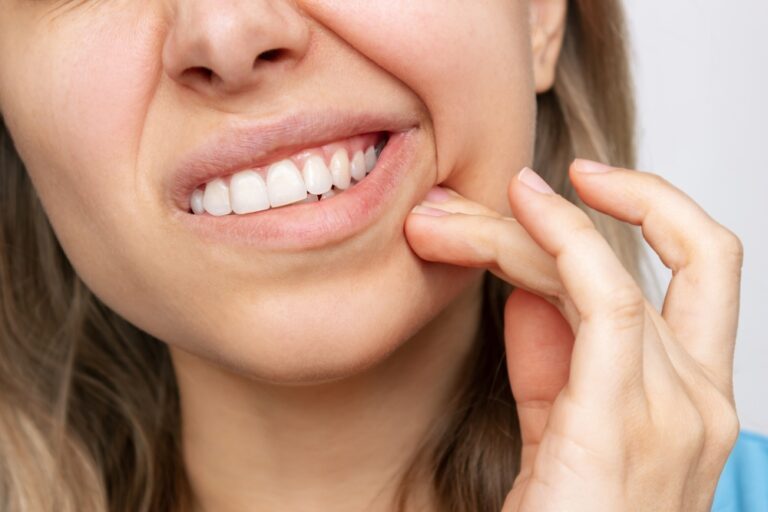Do you experience a sharp pain in your teeth when you eat or drink something cold? If so, you may have sensitive teeth. While cavities are a common cause of tooth sensitivity, they are not the only one. In fact, you can experience sensitivity even if you have never had a cavity.
Teeth sensitivity occurs when the enamel on your teeth wears away or your gums recede, exposing the underlying layer of your teeth called dentin. Dentin contains tiny tubes that lead to the nerves in your teeth, which can cause pain when they are exposed to hot, cold, sweet, or acidic foods and drinks. Some other causes of tooth sensitivity include brushing your teeth too hard, grinding your teeth, and using toothpaste or mouthwash that contains harsh chemicals.
If you have sensitive teeth, it is important to see your dentist to determine the underlying cause and develop a treatment plan. Your dentist may recommend using a desensitizing toothpaste, avoiding certain foods and drinks, or undergoing a dental procedure such as a filling or crown. By taking steps to address your tooth sensitivity, you can enjoy your favorite foods and drinks without discomfort.
Understanding Tooth Sensitivity

Tooth sensitivity is a common dental issue that affects many people. It is characterized by a sharp, sudden pain in response to cold, hot, sweet, or sour foods and drinks. If you experience tooth sensitivity, you may feel discomfort or pain that can last for a few seconds or several minutes.
There are several reasons why your teeth might be sensitive to cold, and a cavity is just one of them. Here are some common causes of tooth sensitivity:
- Worn enamel: Enamel is the hard, protective layer that covers your teeth. If your enamel is worn down, your teeth may become sensitive to cold and other stimuli.
- Gum recession: Gum recession occurs when the gums pull away from the teeth, exposing the sensitive root surfaces.
- Tooth decay: Tooth decay can cause sensitivity when the cavity reaches the inner layer of the tooth, called the dentin.
- Teeth grinding: Grinding your teeth can cause enamel to wear down, leading to sensitivity.
- Dental procedures: Some dental procedures, such as teeth whitening or the placement of a crown or filling, can cause temporary sensitivity.
Tooth sensitivity can be managed with proper dental care and treatment. Here are some tips to help you manage your tooth sensitivity:
- Use a soft-bristled toothbrush and brush gently to avoid further damage to your enamel and gums.
- Use toothpaste specifically designed for sensitive teeth, which contains desensitizing agents that can help reduce sensitivity.
- Avoid acidic and sugary foods and drinks, which can erode enamel and cause sensitivity.
- Wear a mouthguard if you grind your teeth at night.
- Visit your dentist regularly for check-ups and cleanings.
In conclusion, tooth sensitivity can be uncomfortable, but it is a treatable condition. By understanding the causes of sensitivity and taking steps to manage it, you can enjoy a pain-free smile.
Cold Sensitivity Without a Cavity: Is It Possible?
If you experience tooth sensitivity to cold, you may automatically assume that you have a cavity. However, there are several other reasons why your teeth may be sensitive to cold without the presence of a cavity. In this section, we’ll explore some of the possible causes of cold sensitivity without a cavity.
One possible cause of cold sensitivity is gum recession. When your gums recede, the roots of your teeth become exposed. Unlike the enamel on the crown of your tooth, the root does not have a protective layer of enamel. This makes it more susceptible to sensitivity. Gum recession can be caused by a number of factors, including aggressive brushing, gum disease, and aging.
Another possible cause of cold sensitivity is enamel erosion. Enamel erosion can be caused by a variety of factors, including acidic foods and drinks, tooth grinding, and certain medications. When your enamel is eroded, the underlying dentin is exposed. The dentin contains tiny tubules that lead to the nerve of your tooth, which can cause sensitivity.
Teeth whitening treatments can also cause cold sensitivity. Whitening treatments can cause temporary sensitivity, which usually goes away after a few days. However, some people may experience more severe sensitivity that lasts longer.
In some cases, an ill-fitting crown or onlay can cause cold sensitivity. If your crown or onlay is not properly fitted, it can cause your teeth to become sensitive to cold. This is because the crown or onlay may not be properly sealing the tooth, which can allow cold air or liquids to reach the nerve of your tooth.
In conclusion, there are several reasons why your teeth may be sensitive to cold without the presence of a cavity. Gum recession, enamel erosion, teeth whitening treatments, and ill-fitting crowns or onlays can all cause cold sensitivity. If you are experiencing cold sensitivity, it is important to talk to your dentist to determine the underlying cause and develop an appropriate treatment plan.
Common Causes of Tooth Sensitivity to Cold

If you experience tooth sensitivity to cold, you are not alone. Many people suffer from this discomfort, and there are several reasons why it can occur. Here are some common causes of tooth sensitivity to cold:
- Gum Recession: When your gum tissue pulls away from your teeth, it exposes the root surface of your teeth. This can cause sensitivity to cold and hot temperatures.
- Enamel Erosion: The enamel on your teeth is the hard, protective outer layer. When it wears away, it exposes the sensitive dentin layer underneath, which can cause sensitivity to cold and hot temperatures.
- Brushing Too Hard: Brushing your teeth too hard or using a toothbrush with hard bristles can wear away the enamel on your teeth, leading to sensitivity.
- Acidic Foods and Drinks: Consuming acidic foods and drinks, such as citrus fruits, soda, and wine, can erode your tooth enamel and cause sensitivity.
- Teeth Grinding: Grinding your teeth can wear down the enamel and expose the dentin layer, leading to sensitivity.
- Recent Dental Work: If you have recently had dental work done, such as a filling or crown, it can cause sensitivity to cold and hot temperatures.
- Age-Related Gum Disease: As you age, your gums may recede and expose the root surface of your teeth, causing sensitivity.
- Ill-Fitting Dental Appliances: If you have a poorly fitting crown, bridge, or denture, it can cause your teeth to become sensitive to cold and hot temperatures.
- Pregnancy: Hormonal changes during pregnancy can cause the gums to become inflamed and sensitive, leading to tooth sensitivity.
If you are experiencing tooth sensitivity to cold, it is important to talk to your dentist. They can help determine the cause of your sensitivity and recommend appropriate treatment options.
Dental Conditions Associated with Cold Sensitivity
If you are experiencing sensitivity in your teeth when consuming cold foods and beverages, it is possible that you may have an underlying dental condition that is causing this discomfort. Here are two common dental conditions that are associated with cold sensitivity:
Gum Recession
Gum recession occurs when the gums pull back from the teeth, exposing the roots of the teeth. This can happen due to a number of reasons, including gum disease, brushing too hard, or simply aging. When the roots of the teeth are exposed, they become more sensitive to cold, hot, sweet, and acidic foods and beverages.
If you are experiencing cold sensitivity due to gum recession, your dentist may recommend a desensitizing toothpaste or a fluoride treatment to help strengthen the enamel on your teeth. In some cases, a gum graft may be necessary to cover the exposed roots and reduce sensitivity.
Enamel Erosion
Enamel erosion occurs when the protective layer of enamel on your teeth wears away, exposing the sensitive dentin layer underneath. This can happen due to a number of reasons, including acid reflux, frequent consumption of acidic foods and beverages, and brushing too hard.
If you are experiencing cold sensitivity due to enamel erosion, your dentist may recommend a fluoride treatment or a bonding procedure to help protect the exposed dentin and reduce sensitivity. Additionally, your dentist may recommend changes to your diet and oral hygiene habits to prevent further enamel erosion.
In conclusion, if you are experiencing sensitivity to cold foods and beverages, it is important to visit your dentist to determine the underlying cause of your discomfort. By addressing any dental conditions that may be causing your sensitivity, you can enjoy your favorite cold treats without any discomfort.
Preventing Cold Sensitivity in Teeth

If you are experiencing sensitivity in your teeth when exposed to cold, there are some steps you can take to prevent it from happening in the future. Here are some tips to help you prevent cold sensitivity in your teeth:
- Use a toothpaste designed for sensitive teeth: There are many toothpaste options available that are specifically formulated to help with tooth sensitivity. These toothpastes contain ingredients that help to block the tiny tubules in your teeth that lead to the nerves, reducing sensitivity.
- Brush gently: Brushing too hard can cause your gums to recede, exposing the sensitive roots of your teeth. Make sure you are using a soft-bristled toothbrush and brushing gently.
- Avoid acidic foods and drinks: Acidic foods and drinks can erode your tooth enamel, making your teeth more sensitive to cold. Try to limit your consumption of acidic foods and drinks like citrus fruits, soda, and sports drinks.
- Wear a mouthguard: If you grind your teeth at night, wearing a mouthguard can help to protect your teeth from damage and reduce sensitivity.
- Get regular dental checkups: Regular dental checkups can help to identify any issues that may be causing your tooth sensitivity, such as gum disease or an ill-fitting crown. Your dentist can recommend treatments to help alleviate your sensitivity.
By following these tips, you can help to prevent cold sensitivity in your teeth and enjoy your favorite cold foods and drinks without discomfort.
Treatment Options for Sensitive Teeth
If you experience tooth sensitivity to cold without a cavity, there are various treatment options available. In this section, we will discuss two categories of treatments: in-office treatments and at-home remedies.
In-Office Treatments
- Fluoride varnish: A fluoride varnish is a quick and painless treatment that can help strengthen your tooth enamel and reduce sensitivity. Your dentist will apply a fluoride varnish to your teeth using a brush or a swab.
- Desensitizing agents: Your dentist may apply a desensitizing agent to the affected teeth to block the sensation of pain. These agents work by blocking the nerve pathways that transmit pain signals to the brain.
- Dental bonding: If your tooth sensitivity is caused by exposed tooth roots, your dentist may recommend dental bonding. This procedure involves applying a tooth-colored resin to the affected teeth to cover the exposed roots.
At-Home Remedies
- Desensitizing toothpaste: Desensitizing toothpaste contains compounds that block pain signals from the tooth nerve to the brain. Use it regularly as directed by your dentist or the product label.
- Salt water rinse: Rinse your mouth with warm salt water to reduce inflammation and sensitivity.
- Soft-bristled toothbrush: Use a soft-bristled toothbrush and gentle brushing techniques to avoid further damage to your tooth enamel.
- Avoid acidic foods and drinks: Acidic foods and drinks can erode your tooth enamel, making your teeth more sensitive.
- Mouthguard: If you grind your teeth at night, your dentist may recommend a mouthguard to protect your teeth from further damage.
In conclusion, tooth sensitivity to cold without a cavity can be treated effectively with various in-office treatments and at-home remedies. Consult with your dentist to determine the best treatment option for you.
When to See a Dentist
If you are experiencing tooth sensitivity to cold, it is important to talk to your dentist about it. While there are many home remedies and over-the-counter products that can help alleviate the pain associated with sensitive teeth, it is important to rule out any underlying dental issues that may be causing the sensitivity.
Here are some signs that it may be time to see a dentist:
- Your tooth sensitivity is severe and persistent, even after trying home remedies and over-the-counter products.
- You are experiencing tooth pain in addition to sensitivity, especially when biting down or chewing.
- You have noticed any changes in the appearance of your teeth, such as discoloration or visible cracks.
- You have recently undergone dental work, such as a filling or root canal, and are experiencing sensitivity to cold.
- You have noticed any signs of gum disease, such as bleeding or swollen gums.
Your dentist can perform a thorough examination to determine the cause of your tooth sensitivity and recommend appropriate treatment options. Depending on the cause of your sensitivity, your dentist may recommend a fluoride treatment, dental bonding, or a root canal.
Remember, it is important to address tooth sensitivity early on to prevent further damage and discomfort. Don’t hesitate to schedule an appointment with your dentist if you are experiencing any of the above symptoms.
Frequently Asked Questions
Why do my teeth feel cold and hurt?
Feeling pain or discomfort in your teeth while eating or drinking something cold is a common problem. This happens when your tooth enamel wears down or your gums recede, exposing the underlying layer of dentin. Dentin contains tiny tubes that lead to your tooth’s nerve, which can cause pain or sensitivity when exposed to cold or hot temperatures.
Why are my teeth sensitive all of a sudden?
Teeth sensitivity can occur suddenly due to various reasons, including tooth decay, gum disease, teeth grinding, or even brushing your teeth too hard. Changes in your diet, such as consuming acidic foods or drinks, can also lead to tooth sensitivity.
Can your tooth be sensitive without a cavity?
Yes, teeth sensitivity can occur without a cavity. As mentioned earlier, tooth sensitivity can be due to enamel erosion or gum recession, exposing the dentin layer. Additionally, teeth sensitivity can also be caused by teeth grinding, tooth fractures, or recent dental work.
Why is my tooth sensitive to cold but no cavity?
Your tooth can be sensitive to cold without a cavity if the enamel has worn down, exposing the underlying dentin layer. Other reasons for tooth sensitivity include gum recession, teeth grinding, or recent dental work. It is essential to consult a dentist to determine the root cause of your tooth sensitivity.
Why does my tooth hurt if it’s not a cavity?
Tooth pain can occur due to various reasons other than cavities, such as gum disease, tooth fractures, teeth grinding, or even sinus infections. It is best to consult a dentist to determine the root cause of your tooth pain and receive appropriate treatment.
Why are my teeth so sensitive to cold all of a sudden?
Teeth sensitivity can occur suddenly due to various reasons, including tooth decay, gum disease, teeth grinding, or even brushing your teeth too hard. Changes in your diet, such as consuming acidic foods or drinks, can also lead to tooth sensitivity. It is essential to consult a dentist to determine the root cause of your tooth sensitivity and receive appropriate treatment.






